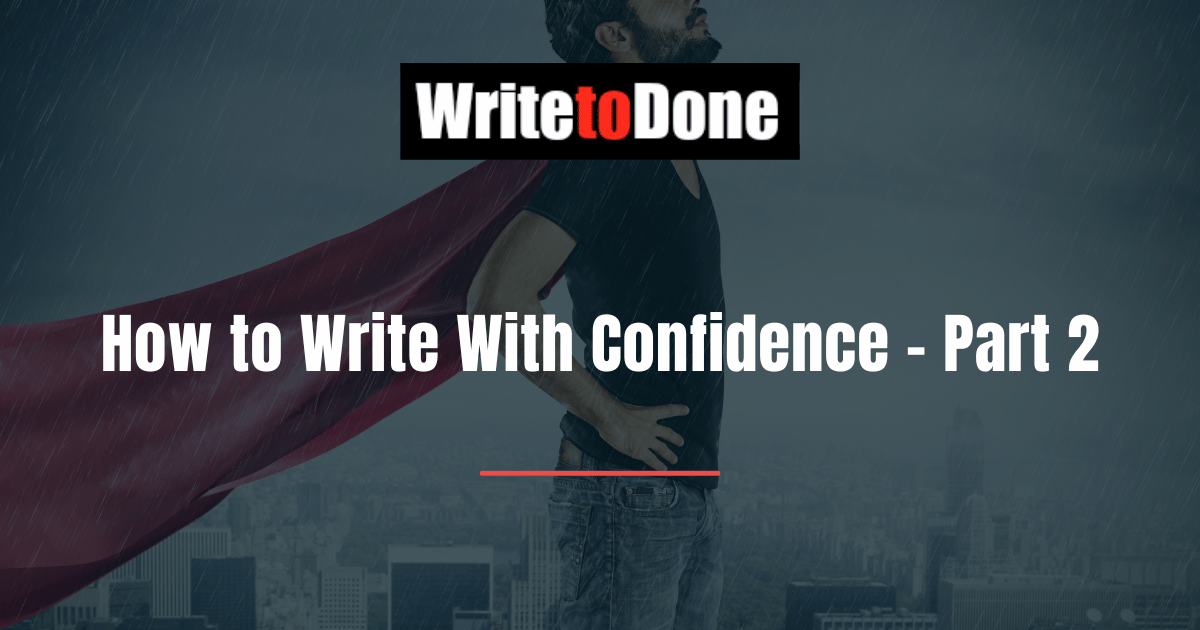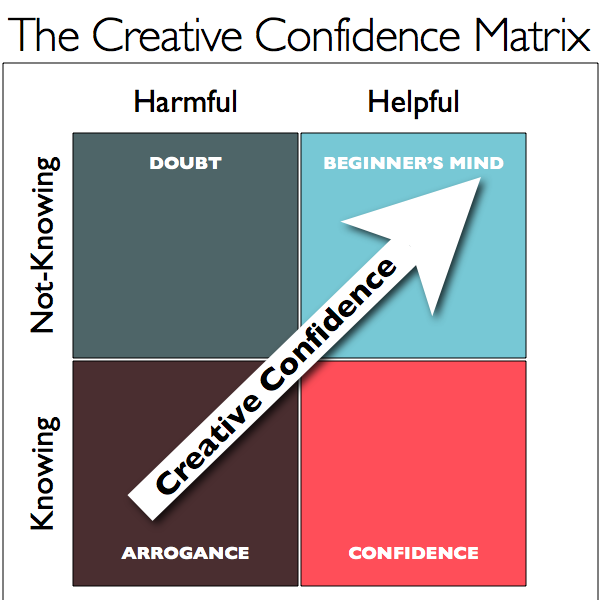Do you want to write with confidence?
I’m sure you do. As writers, we yearn to feel solid ground under our feet – and that’s what confidence promises.
However …
High confidence is the enemy of good writing.
In this post, we’ll look at confidence from a Zen point of view, and I’ll introduce you to Beginner’s Mind, which is the ultimate creative state of mind.
Where are you on the Confidence Continuum?
Confidence is the belief in one’s powers or abilities.~ Oxford Dictionary
The word ‘belief’ implies that confidence is a subjective idea, the sum of thoughts and stories about our ability.
But it’s not only our thoughts and stories that determine confidence. We are social animals and confidence doesn’t exist in a vacuum.
We are all somewhere on a continuum between being dependent on the opinion of others at one end, and being independent of the opinion of others at the other end of the spectrum.
Where are *you* on this continuum?
Some people need a lot of outward indicators of success to feel confident, whereas others may feel certain of their ability, despite few markers of success.
For example, as writers we might want to take feedback from readers, or reviews, or book sales, or blog comments as indicators of our ability as writers. But this kind of confidence is built upon shaky ground, as it’s dependent on the reaction of others.
In contrast, here is a different stance:
I was always looking outside myself for strength and confidence, but it comes from within. It is there all the time. ~ Anna Freud
How can you find this inner strength? Read on to find the answer.
Keep in mind that there’s more than one kind of confidence. There are two distinct types: performance confidence and creative confidence – and it’s important to understand the difference between them.
What do gymnasts, musicians, brain surgeons, and pilots have in common?
All performers need to develop a high level of performance confidence.
Performance confidence means mastery gained through practice and repetition.
Whether you’re a musician, an athlete or a pilot, or any other kind of performer, the training requires that each move is practiced over and over until it becomes automatic.
The more you practice as a performer, the more your confidence grows.
Unfortunately, this kind of confidence doesn’t apply to writers.
Each piece we write has to be unique and we can’t use repetition as the foundation for confidence.
What writers, composers, and painters need
Creators need creative confidence.
Creative confidence means that you trust in the creative process. This kind of confidence can’t be reached through repetition; it comes through learning to access a creative state of mind.
In order to show exactly how confidence and creativity interact, I designed the Creative Confidence Matrix below.
The Creative Confidence Matrix
Matrix (noun)
1. An environment or material in which something develops.
2. A mass of fine-grained rock in which gems, crystals, or fossils are embedded.
The Creative Confidence Matrix is a framework for understanding the interplay between confidence and creativity. It can help maximize your creative confidence.
As you can see, the Creative Confidence Matrix is divided into four quadrants. The two on the left-hand side, Doubt and Arrogance, are harmful to the creative process, whereas the two on the right-hand side, Beginner’s Mind and Confidence are helpful.
Let’s take a look at each quadrant in turn.
The problem with ARROGANCE
Creativity comes from a conflict of ideas. ~ Donatella Versace
Creativity is our brain’s way of solving problems. It’s triggered through disconnects, and springs into action when we see some dots – but can’t quite connect them. That’s when the creative brain kicks in and finds a solution.
The mind-state of arrogance sends a signal to the brain that you have all the answers. Because of this message, the creative brain isn’t triggered; there is no conflict of ideas.
When people feel arrogant, they dismiss any ideas that might conflict with what they believe is right. This is why arrogance kills creativity.
How DOUBT affects creativity
The worst enemy to creativity is self-doubt. ~ Sylvia Plath
Doubt puts a damper on creativity. It’s a self-absorbed state of mind which generates anxious questions. Like these …
Am I good enough?
Have I got anything to say?
Will people laugh at me?
Can I do it?
Do these questions seem familiar?
Doubt means that the mind is consumed with negative personal stories and memories.
When the mind is consumed with personal stories, creativity takes a break. The reason is simple: to be creative, the mind needs to be open to receiving new ideas.
Why CONFIDENCE isn’t always helpful
When you know something well, you feel confident, right?
Imagine for a moment that you are a runner and want to write about running.
You know about running, about the grind of training, the highs that come with pushing yourself beyond your limits. You know about technique, and about gear.
You are confident because you know about the topic.
Sounds good, doesn’t it?
And it is. It’s good for utilitarian writing. With this kind of confidence, you can crank out article after article quite quickly. But that’s all it’s going to be: utilitarian writing.
The reason why confidence hinders you from writing something out of the ordinary, is that when you ‘know’ something, your brain goes to sleep and your creativity doesn’t even get off the sofa to greet you.
It really depends on what you want as a writer.
If all you aspire to is to crank out articles in the shortest possible time, then this kind of confidence will suffice. But if you aspire to grow as a writer and learn to create outstanding fiction or non-fiction, then the confidence that comes from a sense of knowing will be more hindrance than help.
For example, Alan Sillitoe ‘knew’ all about running. But he needed to let go of all ‘knowing’ in order to come up with his inspiring short story, “The Loneliness of the Long Distance Runner” – which is still a bestseller, half a century later.
Why BEGINNER’S MIND is the ultimate creative state of mind
In the beginner’s mind there are many possibilities, but in the expert’s there are few. ~ Shunryu Suzuki, Zen Master
There is a state of mind that taps directly into our wellspring of creativity.
In Zen it’s called Beginner’s Mind. It’s a state of total freshness where you experience everything anew in each moment.
Beginner’s Mind is the direct route to creative confidence.
In this state of mind, you have no expectations, no fixed view of yourself, or preconceived ideas about what you are going to create. Your mind is open and receptive.
Beginner’s Mind connects you directly to your wellspring of creativity.
Here is why…
Imagine that you are searching for a particular channel on the radio. But all you can find is a mix of channels where you hear music, an advert, a news report – all at once. There is also a faint voice that seems to be giving an important message, but it’s drowned out in the cacophony.
The ordinary mind is just like this.
As you start to write, there may be many different thoughts going through your mind.
You might be thinking anxiously about whether you can write well enough. At the back of your mind there may be a niggle about an unpaid bill, or you may have some stray thoughts flitting through your brain about what groceries you need to buy, or why you got into an argument yesterday.
And somewhere, in all of this, is the quiet voice of creativity that is offering you ideas on what to write about.
But the voice of creativity is drowned out.
When you access Beginner’s Mind, the chatter in the mind drops away, you become receptive, and your creativity comes into play.
It’s really quite simple:
When the mind is preoccupied, there is no space for creativity.
Here’s Zen story about this:
Nan-in, a Japanese Zen master, received a university professor who came to inquire about Zen.
Nan-in served tea. He poured his visitor’s cup full, and then kept on pouring.
The professor said, “The cup is overflowing!”
“Like this cup,” Nan-in said, “you are full of your own opinions and ideas. How can I show you Zen unless you first empty your cup?”
It’s the same with creativity. When the mind is preoccupied, there is no place for creativity. It’s only when we let go of thoughts and stories in the mind that the creative wellspring within us begins to flow.
This is the power of Beginner’s Mind.
Read on to find out how to access it.
How to access Beginner’s Mind
You might wonder whether it would take hours of meditation to access Beginner’s Mind. The answer is that it’s simple to access Beginner’s Mind, but difficult to maintain it. That’s where regular meditation practice can be helpful.
There is a lovely way to access Beginner’s Mind. It’s the practice of the half-smile. Lift the corners of your mouth slightly for the space of three full breaths. (You can think of this as ‘lip yoga’).
When you try it, you’ll immediately notice a mind-shift that makes you feel calmer and more receptive. You’ll also feel a surge of creativity.
At first, you may find that the state of Beginner’s Mind is fleeting. But the more you practice it, the more you can sustain this calm, creative state for longer. Try sticking notes saying BEGINNER’S MIND on your computer or your work-station. Every time you notice one of the notes, take three breaths and practice the half-smile.
The more you access Beginner’s Mind, the more you’ll learn to trust the creative process and be able to write with confidence.
What are your thoughts? Please share in the comments …


















